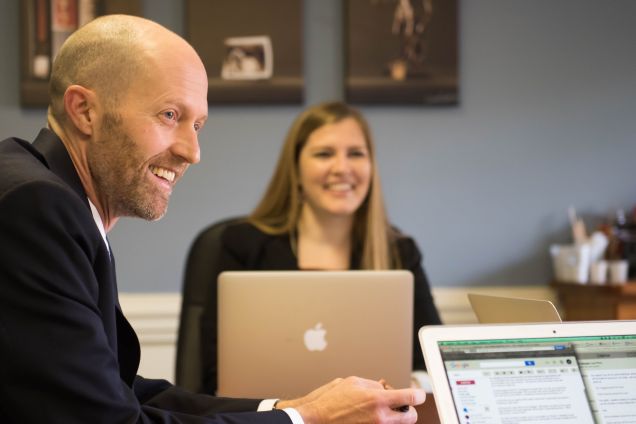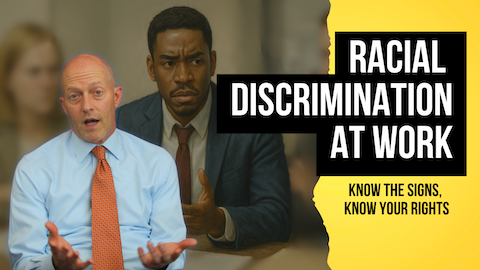 It was shortly before Christmas in 2005 when the call came. The US Attorney for the District of Columbia called to offer me a position as an Assistant US Attorney (AUSA). I was thirty-three and married with a ten-month-old son, and this was a long time in coming.
It was shortly before Christmas in 2005 when the call came. The US Attorney for the District of Columbia called to offer me a position as an Assistant US Attorney (AUSA). I was thirty-three and married with a ten-month-old son, and this was a long time in coming.
After graduating from Georgetown University Law Center in 2001, I returned to my home state of North Carolina to join a midsize firm in Raleigh. As a new associate, I worked in a section of the firm that represented school boards all across the state. My interest was in litigation, and that is what I did, handling everything from contested student suspensions to defending school systems when sued. I loved the job, but soon realized that I would see little courtroom time in a civil litigation practice.
After two years, I got engaged to a woman I had met in law school. She was in Washington, DC, and announced that she had no desire to move to North Carolina. (I knew it was a lost cause when, upon visiting the state with me for the first time, she said that she thought the trees in the state grew too close together. Not much I could do about that!) So, I gave up that tug-of-war and got a job clerking for a judge in the Superior Court of the District of Columbia. Before taking the bench, the judge was a superstar in the US Attorney’s Office, where he prosecuted many high-profile murder cases. Like me, he had started in private practice, only to realize that he would rarely see the inside of a courtroom. He told me that if I wanted trial experience, there was no better place to get it than the US Attorney’s Office, particularly in the District of Columbia.
With his support, I applied right out of the clerkship. A spot in any US Attorney’s office is highly competitive. These offices have their pick of bright, competitive lawyers who want to work on challenging cases that involve a lot of trial work. While many are motivated by the desire to serve the public, it doesn’t hurt that many who serve as AUSAs go on to high-profile appointed positions or to lucrative jobs in private firms.
Just getting an interview is an achievement: getting the office to consider your application often requires a call from a VIP. The interview process itself is rigorous, with multiple rounds of interviews followed by the harrowing experience of delivering an opening statement in front of senior staff in the office. The final interview is with the US Attorney.
With the support of my judge, I got an interview and made it to the final interview, only to be turned down. It is not uncommon that applicants must apply more than once to get in. I was advised to get some criminal law experience (up to that point I had none) and reapply. So, I did. I got a job with a boutique law firm that specialized in white-collar criminal defense. It was a dream job in many ways: great work with some of the top criminal defense lawyers in the city.
I spent two years with the firm. While there, my wife gave birth to our first child, a boy. I had always wanted to be a father, but like most, I had no real idea what this meant. No one prepared me for how much I would completely fall in love with that little boy. I was also unprepared for how much work being a father would take. Harrison was not the best sleeper, and my wife and I spent many nights with little sleep. She worked as an attorney at a large law firm, so we shared child-care duties as evenly as we could. Fortunately, my work life was flexible and, for the most part, low stress.
It was a good thing, too, because we also had a high-maintenance dog, a cocker spaniel named Sawyer. I found Sawyer running around, lost, in front of the law school while I was studying for the bar. When no one claimed him from the shelter, I adopted him. A sweetheart of a dog, Sawyer soon developed multiple health problems, including diabetes. After many expensive trips to the vet, we found a combination of medications and twice-daily insulin shots could keep him healthy. However, Sawyer, being a dog, did not always cooperate with his treatment. If he found a sugar-laden treat—like an entire loaf of bread, for instance—that he could reach, he would eat it. This would make his blood sugar go haywire. As a result, he would often pee and poop all over the house, which, of course, had to be cleaned up. And Sawyer would occasionally have seizures, sometimes necessitating an emergency trip to the vet. We joked that Sawyer’s care was so expensive that owning him was the equivalent of having another car payment.
Still, life was good. I had a good job and was able to get home to see and spend time with my son. I knew many attorneys who by choice or necessity were weekend parents. Due to heavy billing requirements and travel, their kids were asleep when they left in the morning and on the way to bed when they got home. After Harrison was born, it was clear to me that I would never make that choice. It wasn’t so much of a conscious declaration; it just was. There was no way I would not be around him during waking hours every day. I quickly surmised that it would be difficult to cram parenting into a few hours on the weekend. (I know that many parents don’t have a choice. I was, and am, lucky to have the ability to structure my life as I want, within certain parameters.) But that choice was about to be much more difficult. I joined the US Attorney’s Office in the fall of 2006. The District of Columbia US Attorney’s Office is unique in that it handles both state-level criminal matters—primarily “street crime” like assault, drug crimes, etc.—as well as prosecutions involving violations of federal law. This is a real benefit for attorneys seeking trial experience because state-level prosecutions tend to take less time and go to trial more often. While an attorney in private practice might have a case go to trial once every five to ten years, and a federal prosecutor might have a trial twice a year, a prosecutor in District of Columbia Superior Court might have a jury trial every month—not to mention dozens of contested witness hearings before a judge. Indeed, a prosecutor in District of Columbia Superior Court literally lives in the courthouse.
All new prosecutors start in the misdemeanor section. This is a trial lawyer’s version of trial by fire. District of Columbia Superior Court is high volume, with dozens of misdemeanor cases going on every day. Prosecutors handling these cases sometimes receive a file literally hours before a case goes to trial. As you might imagine, this is both exhilarating and terrifying. It is particularly difficult for type-A personalities who make it into the office. Like me, many of them got where they are by mastering every little detail of cases they worked on. If you had a matter go to court, you prepared the case and knew everything you could about it. This was impossible in the US Attorney’s Office. The case volume was too high, and prosecutors in the misdemeanor section often were assigned cases they didn’t prepare. Sometimes—many times—there would be mistakes: witnesses were not subpoenaed, evidence was not procured, etc. But the prosecutor in the courtroom could not soothe an angry judge by noting that someone else prepared the case. You just had to do the best you could.
This was a harrowing time for all new prosecutors. It was not uncommon for attorneys to lose weight, given the long hours and stress. I did. Slight to begin with, I dropped from approximately 160 pounds on a six-foot frame to somewhere under 150. My suits hung off me, my pants held up by a belt cinched as tight as I could get it. Many of my colleagues were younger than me. Some were unmarried. Most did not have children. As I soon figured out, this made a big, big difference. Like me in my childless years, these attorneys worked until they could work no more, then went home to relax and get a few hours of sleep before starting the process all over again.
I could not do that if I wanted to see my son during the week (not to mention my wife, or take on the many child-care duties). And as anyone who has had children will tell you, it is a wonderful thing to see your toddler after work—it is also a lot of work. You can’t come home, kick off your shoes, have a beer, and unwind. Your child is on you from the moment you walk in the door. Some of this time is delightful. Your child is cute and full of energy, happy to see you. But you still must be “on.” Sometimes it’s not so delightful. Your child is tired and strung out, crying, throwing food, and so on. With him is the now strung-out person who has cared for him all day—just waiting for the opportunity to hand off the little darling. At this point, Harrison was walking but unaware of danger. Turn your back for a second, and he’d try to stick a finger in a light socket or come perilously close to tumbling headfirst down the steps. Just being with a child that age is nonstop, sometimes grinding, work. And this is when the child is in a good mood. Often toddlers at the end of a long day are not. Looking back on it and comparing him to his siblings, Harrison was high maintenance—on the move all the time. And when he was in a bad mood, he was in a bad mood. Coming home to a toddler in a good mood is work; coming home to one in a bad mood is like walking into a buzz saw. So, while my childless colleagues headed off to a bar with friends or went home to lie on the couch, I went home to chase after a toddler and tend to a high-maintenance dog. I know that many endure worse. We had it good in that my wife and I had jobs and everyone was healthy. But compared to life without kids, this was a lot of work—and stress.
I did well at the US Attorney’s Office. I was good on my feet and excelled in court. As a result, I was put on a special “kid caseload,” which involved misdemeanor prosecutions of child sex abuse cases. Unlike most misdemeanor cases, these were legally complicated and often involved expert testimony from nurses and doctors—not to mention the heartbreaking subject matter. I was thrilled with the assignment, but it took a toll. The long, stressful hours at work followed by stress at home caused health problems. The first and most difficult was insomnia. I began to wake up in the middle of the night, heart pounding, unable to sleep. And when I could sleep, I was many times awakened by a crying Harrison. I left the house early every day so that I could meet my witnesses before court. I left my suits downstairs because I couldn’t see to dress in my room. Even if I could, I didn’t dare make noise that would wake my wife and child. I sometimes came downstairs to find that Sawyer had peed and pooped on the floor. I couldn’t just leave it. So, I’d clean it up, wolf down some breakfast, and sprint to catch the bus.
Eventually, my class rotated out of misdemeanors to the trial sections. “Guns and drugs” was the next rotation. If anything, it was more stressful than misdemeanors. Now we were trying jury trials. The case volume was crushing. It was particularly difficult starting a new rotation because you were taking another lawyer’s caseload, as that lawyer rotated to other sections in the office. This meant that I had to learn an entirely new caseload and relevant law, as the cases kept on churning. All my colleagues were under immense stress. Many, including me, were thrown into situations where mastery was simply impossible. Survival was the name of the game. Of course, there were benefits. We wanted trial experience, and we got it. Within a year or two, a prosecutor in the District of Columbia office takes more cases to trial than many attorneys do in their entire career. It is, as the expression goes, like drinking from a fire hose. While I learned that the hard way, learn I did—and a lot. I don’t think a lawyer ever gets over trial nerves, but I soon developed my own style and rhythm. I learned the coveted skill of trying jury trials.
My own routine became even more extreme. I stopped trying to eat breakfast at home. Instead, I’d drink a cup of coffee and eat oatmeal every morning in the office while meeting with officers or reviewing the cases scheduled for that day. I continued to sleep poorly. I often felt like I was in a fog. Unwilling to miss time with my family, I left every day at 6:00 p.m., no matter what. Some of my colleagues at this point were beginning to start families, too, though the majority still did not have children.
After surviving “guns and drugs,” I rotated to another trial section in domestic violence. Though less brutal, this was a busy rotation. The cases were more serious, involving violent crimes that required putting witnesses before the grand jury. The domestic violence section was great. The supervisors were supportive and understanding. During this time, my wife gave birth to our second son, Jonah. He was born healthy and (relatively) happy. We were thrilled. However, I was unprepared for how difficult having a second child would be. Sure, I knew it would be more work, but having raised one son to two years of age, I figured that I had seen the worst of the learning curve. Not true. Adding a second for us was exponentially more difficult. With one child, there was always at least the possibility of getting a break. If the spouse could take the child for an hour or so, one of us could take a shower, read a book, or go for a run. With two, neither of us got a break—ever. To make matters worse, we had a small house, and the boys shared a room. This made coordinating naps difficult, and pretty much no one slept all the way through the night.
If coming home to one had been work, coming home to two was a test of patience and strength. I remember times walking up to the house and being able to hear our newborn crying, Harrison screaming (he was discovering tantrums by now), and the dog howling. I wish I could say that I were being funny. I continued to make family my priority. I did my half of the child care and shared the household duties: I did most of the shopping and cooking in my family. This meant that I pretty much did nothing but work and raise children, as did my wife.
By then I was chronically sleep deprived and, as I now know, depressed. I would cry for no reason, had little appetite, and could not sleep, even though I was exhausted. I finally confided in my doctor, who sent me to a psychologist. She put me on antidepressants and prescription sleep aids. She said I suffered from generalized anxiety disorder.
Despite this, I continued to perform well at work, receiving high marks and even winning an award for my performance in the domestic violence unit. No one at work had any idea what I was going through, and with good reason. It was a high-stress environment—everyone was operating in the red zone.
One might reasonably ask why I didn’t look for another job or ask for a different assignment within the office. As my doctor said, “You know, in many other parts of the country, working like this would be considered insanity. Someone might say, ‘Why are you doing this? Just find another job.’ But this is a different sort of town. My husband is an attorney. I know that your job is considered by many to be the Holy Grail.”
I didn’t consider scaling back or quitting an option. It’s just not something that people in the office commonly did. Moreover, it was not in keeping with how I wanted to view myself. I didn’t need help. I just needed to tough it out. Certainly, women have challenges balancing child care and work. In some ways, women face more complicated issues. Certainly, only women can be pregnant. Still, men face their own headwinds. Unlike women, men are rewarded for having a family. Research has shown that a résumé indicating that a man has children (e.g., “Other activities: coaching son’s Little League team”) is more likely to get selected for interviews than the same résumé with a woman’s name on it. Employers, consciously or not, like the picture of a male worker with a family. So, men have it easier in that regard. The same studies suggest that men with families are penalized more harshly than women if they ask to take time off to care for a child. It seems we like men to demonstrate virility and stability by having a family, primarily because we assume they will perform better at work. If a man betrays that notion by indicating that he occasionally prioritizes family over work, then he is summarily kicked off that perch.
I, no doubt, internalized that idea. Sure, I could want to participate in the life of my children, but that had to be on my own time, and only after I had done well at work.
I want to note here that no one at the US Attorney’s Office ever suggested that I sacrifice family for work. Indeed, the office, particularly the domestic violence section, was rightly known for being family-friendly. I shudder to think of working with family stress in a job that is openly hostile to caregiver responsibilities. And yet I hear about it daily in my practice. This is shameful behavior on the part of employers. I marvel at what some of my clients have had to endure.
Eventually, I realized I could not sustain the way I was working. Indeed, trying to balance work and family was backfiring at home. Because I was in a constant state of exhaustion, I had little patience and was short with my wife and children. It was taking a toll. I went to my supervisor and requested an early rotation to the appellate section, known for being not nearly as hectic. To the office’s credit, it quickly complied with this request. I moved to appellate, but not before I came down with a terrible respiratory tract infection. I hobbled to that section, broken in many respects.
After completing that rotation, I left the office to open my own firm. For years, I dealt with guilt over my departure. Many of my colleagues expressed admiration that I would leave the safety of a government job—in the midst of an economic meltdown, no less—to hang out a shingle. But for me, it felt different. It’s true that I had always wanted to start my own firm. I’d had that dream since before I graduated from law school. But the way it happened felt far from heroic. I felt like a failure.
I have since made my peace with that time in my life and recognize that my choice did not reflect a weakness on my part. It was just a very difficult time that I dealt with the best I could.
As I look back on it, I realize that what made that balancing act nearly impossible for me was having children. You will not find it surprising—particularly if you have kids—that becoming a parent is a profound stage of life. There are many wonderful things about it, but also some not so wonderful. In part, I faced the difficulties I did because I simply was not willing to forgo playing a significant daily role in my children’s lives. This is not heroic. This decision was as much for me as it was and is for them. I would like to think that in the long run my family will benefit from having me around, though, to be honest, I’m not sure this is a given. Still, that is the choice I made. Some of it was structural. Perhaps it would have been different if my wife had stayed at home, but she didn’t. We relied on her salary, so it wasn’t an option. Perhaps I wouldn’t have felt the rush to get home if we, as a family, had structured our lives so that Anne took responsibility for most of the child-care and household duties. I don’t know that that would have been ideal—and it would have involved a lot more unrelenting work for Anne. In any event, that was not how our family structure worked.
Other attorneys make different choices. I recall hearing a story about a prosecutor who cross-examined Kenneth Lay in the federal prosecution following the collapse of Enron. This was a career-making case. This AUSA will carry that badge for the rest of his life. When he went back into private practice, he could add “cross-examined Mr. Kenneth Lay in the Enron prosecution, leading to a guilty verdict against Mr. Lay” to his bio, which would literally make him millions of dollars over the course of his career. A story I heard mentioned that after the trial, he went straight home to see his wife and children. His youngest daughter, I believe, was around two. It said that he had not seen her for six months. That was a quarter of her short life.
I recall thinking at the time that I would never make that choice, even if you could guarantee that I would have a successful, front-page prosecution like that. I just would not be away from my children for that length of time. I am not claiming hero-parent status. I don’t mean to criticize this prosecutor or many other workers like him for making that choice. He likely is a great father. There is no question that the time he spent on that case and away from his family will—through the income it will ultimately generate—give his children options that mine will not have.
However, what this AUSA and I do share in common is that we both had the luxury of making those choices. Many parents, perhaps most, don’t. Working is not so much a quality of life issue; it’s a matter of survival. A mother works two jobs and rarely sees her kids, not because it allows her a higher standard of living, but because it’s what she has to do to afford rent and food.
All this is a very long-winded way of sharing with you why I do this work. Raising children is, without argument, a matter of fundamental importance for this nation. Yet, for whatever reason, our country has chosen not to devote many public resources—for example, subsidized day care—to helping parents make balanced career decisions. I think this is shortsighted. For instance, refusing to provide paid sick leave to a restaurant worker with kids means that she has to come to work sick. Not only does this expose everyone at that restaurant to the risk of illness, but it also puts great strain on her. How effective is she as a mother when she comes home after working a twelve-hour shift as a waitress? What if she gets sick, can’t come to work, and loses her job and then her apartment? Even from a selfish perspective, this affects all of us. That kid—the one you don’t know whose parent just lost the apartment—he’s potentially your future dentist, bus driver, or teacher. What happens to him now?
These policy matters are all worthy of debate. But in the meantime, the laws that we do have to protect those with caregiver responsibilities—the FMLA, the PDA, the ADA, and so forth—need to be enforced. For your sake. For the sake of us all. That’s why we do what we do.





